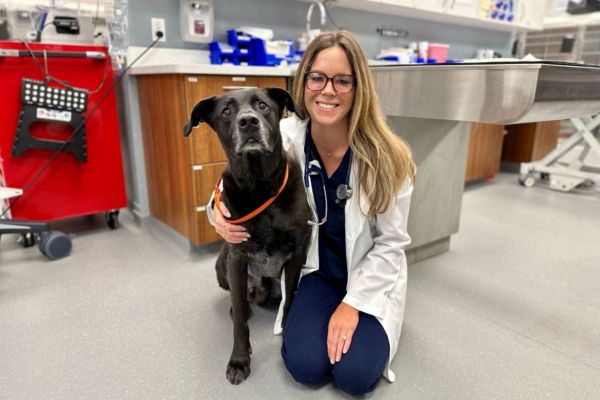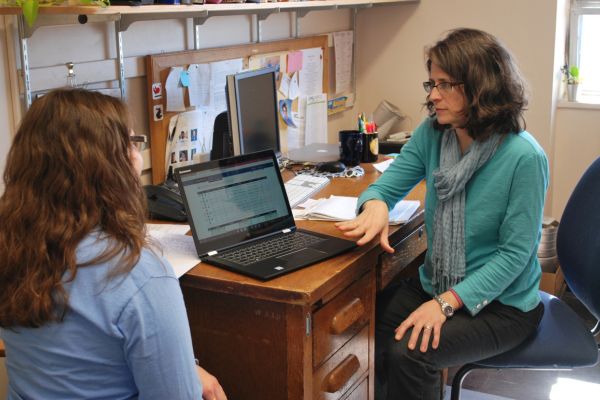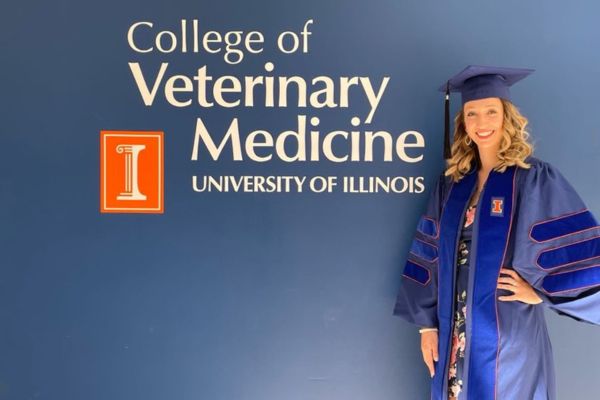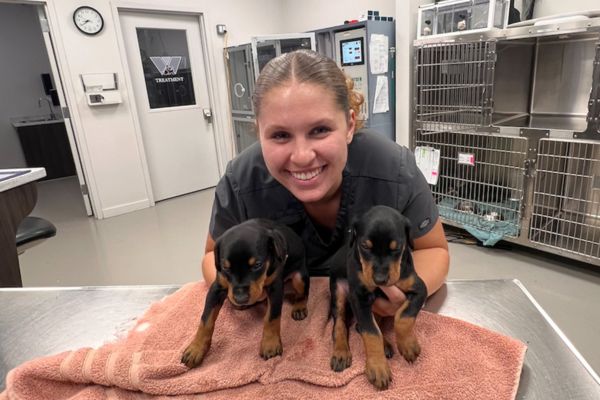Animal Science BS
Pre-Veterinary
Area of Interest
Overview
The UConn Department of Animal Science offers a comprehensive curriculum and experiences to prepare our undergraduate students to apply to veterinary school. The Animal Science program focuses on the study of domestic livestock, companion animals and animal products. While pursuing a BS degree, our Animal Science students learn how animals function through the study of genetics, physiology, anatomy, nutrition and behavior. In addition to Animal Science requirements, students interested in a career in veterinary medicine must complete courses in biochemistry, microbiology and physics, depending on the requirements for specific veterinary schools the student intends to apply to.
Our department boasts modern teaching facilities and barns with all of the farm species (dairy and beef cattle, horses, sheep, swine and poultry) located within walking distance right on campus. The program provides many opportunities in the classroom, research laboratories, jobs in animal care, independent study and internships to "learn by doing" with hands-on experiences at the core of our curriculum. Hands-on experience working with animals increases the potential of acceptance into veterinary school. We have a solid record of success with our undergraduate students gaining admission into veterinary schools across the globe.
Students interested in applying to veterinary school must ensure they meet the entrance requirements for a specific veterinary school. Specific admission requirements vary slightly among veterinary colleges, but all emphasize a strong science background. Veterinary medicine programs are four years in length and admission is competitive. Successful applicants must maintain a high grade point average in their undergraduate career. Our faculty advisors guide students through their undergraduate career and the veterinary school application process. Our students typically apply to veterinary college in September of their senior year of their BS program.
Requirements
Animal Science majors must pass all courses from Group A, at least one course from Group B, at least one course from Group C, and one additional course from either Group B or C. No single class can satisfy more than one requirement.
Every undergraduate student in a baccalaureate degree program in the University, on all campuses, must complete the Common Curriculum. The Common Curriculum requires students to complete six Topics of Inquiry and three Competencies. All students must complete a minimum of 40 credits of coursework approved for the Common Curriculum.
Students must meet a set of requirements established by the college in addition to the University's Common Curriculum requirements. For more information, see the College of Agriculture, Health and Natural Resources section of the Undergraduate Student Catalog.
Sample Four-Year Plan
This is an example schedule for planning purposes only and is meant to be a guide for students and advisors. 120 credits total needed to complete degree. For official degree information, please contact the Degree Audit section of the Office of the Registrar and speak with your advisor.
- ANSC 1001: Introduction to Animal Science (3 Credits) — The biological, physical, and social factors that influence animal production and utilization.
- BIOL 1107: Principles of Biology I (4 Credits) — Designed to provide a foundation for more advanced courses in Biology and related sciences. Topics covered include molecular and cell biology, animal anatomy and physiology. Lab exercises include dissection of preserved animals. CA 3-LAB.
- Information Literacy (4 Credits): To satisfy the Information Literacy requirement, students must pass at least one of the following: ENGL 1007 (Seminar and Studio Writing and Multimodal Composition), ENGL 1010 (Seminar in Academic Writing), ENGL 1011 (Seminar in Writing through Literature).
- UNIV 1810: Animal Science Learning Community (1 Credit) — A course designed to assist students in adjusting to the University of Connecticut and to improve academic performance. Students will be exposed to UConn resources and facilities, enhance their academic and interpersonal skills, and learn strategies for problem solving and time management.
- Common Curriculum OR MATH OR STAT Course (3-4 Credits)
- ANSC 1111: Principles of Animal Nutrition and Feeding (3 Credits) — Digestive anatomy of various species and the classes of nutrients including their digestion, metabolism and sources. Nutrient requirements and feeding standards for livestock, companion animals, exotics and aquatics for purposes of reproduction, lactation, growth, work and maintenance. Classes of feedstuffs, their characteristics, proper utilization, formulating rations and nutritional programs for animal enterprise. Taught with SAAS 113.
- BIOL 1108: Principles of Biology II (4 Credits) — Designed to provide a foundation for more advanced courses in biology and related sciences. Topics covered include evolution and population genetics, plant physiology and diversity, animal diversity and behavior, and ecology. CA 3-LAB.
- CHEM 1127Q: General Chemistry I (4 Credits) — Designed to provide a foundation for more advanced courses in chemistry. Atomic theory, laws and theories concerning the physical and chemical behavior of gases, liquids, solids, and solutions. Quantitative measurements illustrating the laws of chemical combination in the laboratory component. CA 3-LAB.
- Common Curriculum OR MATH OR STAT Course (3-4 Credits)
- Common Curriculum Course (3 Credits)
- PATH 2100: Anatomy and Physiology of Animals (4 Credits) — A study of the anatomy and physiology of animals with reference to pathological changes of the component parts of the body.
- ANSC 3121: Principles of Animal Genetics (3 Credits) — Principles of Mendelian and molecular genetics. Biosynthesis and function of DNA, RNA, and protein. This course also includes introductions to population and quantitative genetics. Information on molecular methods of genetic analysis and examples of genetics in animals of agricultural significance are also provided.
- CHEM 1128Q: General Chemistry II (4 Credits) — Equilibrium, thermodynamics, nuclear chemistry, and kinetics. Properties of some of the more familiar elements and their compounds. Equilibrium in solutions and reactions of the common cations and anions in the laboratory component. CA 3-LAB.
- Common Curriculum OR Group B/C ANSC Elective Course (3-4 Credits)
- ANSC 3122: Reproductive Physiology (4 Credits) — A study of the reproductive anatomy and physiology of domestic animals. Laboratory will include macro and micro anatomy, hormone action, and techniques used in reproductive management of domestic animals.
- ANSC 3194: Career Paths in Animal Science (1 Credit) — A discussion of current employment opportunities in animal sciences. In addition, students will prepare resumes and make oral presentations.
- CHEM 2443: Organic Chemistry (3 Credits) — Structure and reactions of the simpler classes of the compounds of carbon.
- Group B/C ANSC Elective Course (3-4 Credits)
- Common Curriculum Course (3 Credits)
- Group B/C ANSC Elective Course (3-4 Credits)
- CHEM 2444: Organic Chemistry (3 Credits) — A continuation of CHEM 2443.
- CHEM 2445 OR Group B/C ANSC Elective Course (3-4 Credits)
- PHYS 1201Q: General Physics I (4 Credits) — A non-calculus based course introducing the laws of force and motion applied to mechanical phenomena. Concepts such as work, mechanical energy, linear and angular momentum, and energy conservation are explained. The laboratory offers fundamental training in precise measurements. CA 3-LAB.
- ANSC W* OR Common Curriculum Course (3 Credits)
*W course must be taken with the corresponding C course.
- Group B/C ANSC Elective Course (3-4 Credits)
- CHEM 2445 OR Group B/C ANSC Elective Course (3-4 Credits)
- MCB 2610 OR MCB 2000 OR ANSC 4341 (3-4 Credits)
- PHYS 1202Q: General Physics II (4 Credits) — A non-calculus based course introducing the principles governing electromagnetic phenomena, including electromagnetic radiation and waves and electric circuits. The laboratory offers fundamental training in precise measurements. CA 3-LAB.
- ANSC W* OR Common Curriculum Course (1-3 Credits)
*W course must be taken with the corresponding C course.
- ANSC W* OR Elective Course (1-3 Credits)
- Group B/C ANSC Elective Course (3-4 Credits)
- 2000-Level Related OR Elective Course (3 Credits)
- MCB 2610 OR MCB 2000 OR ANSC 4341 (3-4 Credits)
- 2000-Level Related OR Elective Course (3 Credits)
- Common Curriculum Course (3 Credits)
*W course must be taken with the corresponding C course.
- ANSC W* OR Elective Course (1-3 Credits)
- Group B/C ANSC Elective Course (3-4 Credits)
- 2000-Level Related OR Elective Course (3 Credits)
- 2000-Level Related OR Elective Course (3 Credits)
- 2000-Level Related OR Elective Course (3 Credits)
- Elective Course (3 Credits)
*W course must be taken with the corresponding C course.
- CHEM 1127Q: General Chemistry I
- Credits: 4
- Group: A-2
- Offered: Spring
- CHEM 1128Q: General Chemistry II
- Credits: 4
- Offered: Spring
- Prerequisites: CHEM 1127Q, 1137Q or 1147Q
- CHEM 2443: Organic Chemistry
- Credits: 3
- Group: A-2
- Offered: Fall, Spring
- Prerequisites: CHEM 1128Q, 1138Q, 1148Q, or 1126Q
- CHEM 2444: Organic Chemistry
- Credits: 3
- Offered: Fall, Spring
- Prerequisites: CHEM 2443
- CHEM 2445: Organic Chemistry Laboratory
- Credits: 3
- Offered: Fall, Spring
- Prerequisites: CHEM 2444
- COMM 1100: Principles of Public Speaking
- Credits: 3
- Offered: Fall, Spring
- MATH 1131Q: Calculus I
- Credits: 4
- Offered: Fall, Spring
- MCB 2000: Introduction to Biochemistry
- Credits: 4
- Group: A-3
- Offered: Fall, Spring
- Prerequisites: CHEM 2241 or 2444
- MCB 2610: Fundamentals of Microbiology
- Credits: 4
- Group: A-3
- Offered: Fall, Spring
- Prerequisites: CHEM 2241 or 2443
- PHYS 1201Q: General Physics I
- Credits: 4
- Offered: Spring
- Prerequisites: MATH 1060Q or Eq.
- PHYS 1202Q: General Physics II
- Credits: 4
- Offered: Fall, Spring
- Prerequisites: PHYS 1201Q
- STAT 1100Q: Elementary Concepts of Statistics
- Credits: 4
- Offered: Fall, Spring
- Prerequisites: BIOL 1107 or 1108



